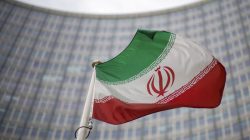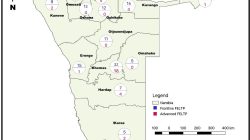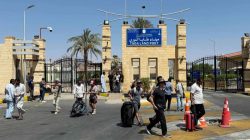By Tawiah MENSAH
Each year on May 25th, Africa Day is celebrated by the member nations of the African Union (AU). This day marks their acknowledgment of the advancements achieved since the establishment of this pan-continental organization.
This event is an opportunity to contemplate the shared difficulties encountered by member states in the worldwide economy. Fortunately, this year’s Africa Day is observed amid predictions from the World Bank forecasting a 3.5% growth rate for Africa, even as global economic stability remains uncertain.
Formerly known as the Organisation of African Unity (OAU), which was founded in 1963, the African Union (AU) seeks to foster unity and cooperation amongst African nations. Its objectives include accelerating political and socioeconomic integration across the continent, along with advocating for shared stances on matters pertinent to Africa.
For its 62nd anniversary, the topic of reparations has emerged as a point of interest. Consequently, this subject has been incorporated into the celebration’s theme.
Seeking Justice for Africans and People of African Heritage Through Reparations.
In line with this theme, four objectives have been established. These encompass: Uniting #Africa and the Diaspora via a Shared Stance on Reparations, Establishing a Worldwide #Reparation Fund to finance reparative initiatives, Enhancing #Diaspora cooperation for more potent international #lobbying efforts, and Returning African cultural treasures to their original homeland.
The two key themes running through the objectives mentioned for Africa Day 2025 are the Diaspora and Reparations.
The term Diaspora denotes individuals who have an affinity for a particular geographical area yet live elsewhere. In this sense, Diaspora pertains to Africans and those of African heritage residing across the world.
The concept of reparations has transformed over time and is currently recognized beyond just war damages. It encompasses various forms of redress and support offered to those who have suffered significant human rights abuses, including acts like slavery, at the hands of their perpetrators.
The part played by Africans in the Diaspora
As stated by Nigerian economist Tony Elumelu, “It is up to us to take charge of our own progress; nobody else will drive Africa’s development for us.”
In other words, it is essential for Africans residing anywhere to contribute whatever they can to the continent’s developmental endeavors. Consequently, individuals in the diaspora might consider starting enterprises in their homeland to generate employment opportunities, thus fostering economic progress.
They had the option to send money to their families via financial institutions like the United Bank for Africa (UBA), an important Pan-African bank operating in many African nations. Additionally, they could set up foreign currency accounts, typically in dollars, at UBA, allowing them access to these funds when visiting ‘their home country.’
Furthermore, African people living outside their home countries should support locally produced products from Africa. In doing this, they contribute to the expansion of native small businesses that manufacture these items. Consequently, this helps generate employment opportunities for the large number of young job seekers across the continent.
Moreover, individuals of African descent living abroad should be ready to offer their specialized skills, particularly those in less prevalent fields, by participating in regular volunteer programs in their native countries.
Africa faces a shortage of healthcare professionals like medical doctors and nurses. Even in nations where sufficient numbers of these staff members are available, they tend not to be uniformly spread out among different regions. Volunteering to work in isolated locations might significantly enhance the health conditions within their respective countries.
Likewise, skilled educators from the Diaspora might volunteer to teach in remote regions temporarily to help improve the teacher-to-student ratios.
Individuals from diaspora communities who possess skills in critical fields such as Information Communication Technology (ICT) can contribute to enhancing their homeland’s capabilities by sharing their expertise with specific governmental organizations. This would aid in developing the necessary competencies within these nations.
Certainly, individuals of African descent living outside their homeland have an essential part to play in Africa’s progress. The importance of engaging them stems from a timeless African saying: “If you wish to travel swiftly, set out alone. If you desire to journey far, embark with others.”
The Role of Reparations in Africa’s Economic Growth
During the 38th AU Summit in February 2025, the heads of state from participating nations concurred upon the theme for Africa Day this year. Their aim is to make reparations central to the African Union’s enduring goals and enhance its ability to offer technological assistance to member countries as they pursue these aims.
As a result, conversations are presently underway with the leaders of nations that played pivotal roles in the transatlantic slave trade and colonization of Africa, seeking reparations. These countries encompass France, the United Kingdom, Germany, Belgium, Italy, Spain, Portugal, and the Netherlands.
Moreover, the request from these previous colonial nations is extensive. Firstly, they call for reforms in international trading systems aimed at ending Africa’s reliance on exporting unprocessed commodities and fostering robust, value-adding economic sectors instead.
Secondly, there is a necessity to reform the global financial systems that put African countries at a disadvantage.
Thirdly, to reinstate Africa’s control over its natural resources, human capital, and policy options. The aim is to guarantee that nations possess the necessary fiscal room and can redirect their financial activities toward shaping their own developmental pathways.
Fourth, divert Foreign Direct Investment (FDI) and Official Development Assistance (ODA) towards strengthening institutional frameworks and national systems, along with developing digital public infrastructures.
Fifth and crucially, providing financial reparations to African countries and communities impacted by colonial exploitation. These efforts might also include investing in infrastructure, education, and healthcare to foster economic growth.
Agenda 2063 – The Africa of Our Dreams
This sentiment is echoed by the former Liberian President, Ellen Johnson Sirleaf, who stated, “The future of Africa rests in the hands of its citizens.”
Agenda 2063 represents a series of programs initiated and presently being executed by the African Union. This concept was initially suggested during the 21st Ordinary Assembly held on May 26, 2013—half a century following the establishment of the Organisation of African Unity—as part of an ambitious blueprint spanning five decades ahead.
The objectives outlined in Agenda 2063 include: eliminating poverty across one generation, achieving political unification—especially via the creation of either a federated or confederated United States of Africa, enhancing democratic practices and judicial systems, ensuring stability and harmony throughout the African continent, reinforcing cultural identity with an “African Renaissance” and embracing pan-African values, promoting gender parity, and attaining autonomy free from external influence.
A Continental African Bank to support Reparations and Investments
A key objective of this year’s Africa Day theme is to Establish a Worldwide #Reparation Fund aimed at supporting reparations efforts.
Here is where UBA steps in. Aligning with their motto ‘Partnership for Advancement,’ UBA provides AfriCash, a money transfer service enabling users to send and receive funds via an extensive network of 1000 branches throughout Africa.
This initiative seeks to establish an effective payment system for trading activities, particularly within the informal sector, while also facilitating official trade processes such as importing and exporting.
Conclusion
As mentioned earlier, it is clear that the theme for Africa Day 2025 and its objectives are aligned with the African Union’s Agenda 2063.
UBA is ideally situated to manage all financial transactions resulting from investments by Africans in the diaspora and contributions to the Global Reparations Fund aimed at constructing the Africa we envision.
Provided by Syndigate Media Inc. (
Syndigate.info
).






